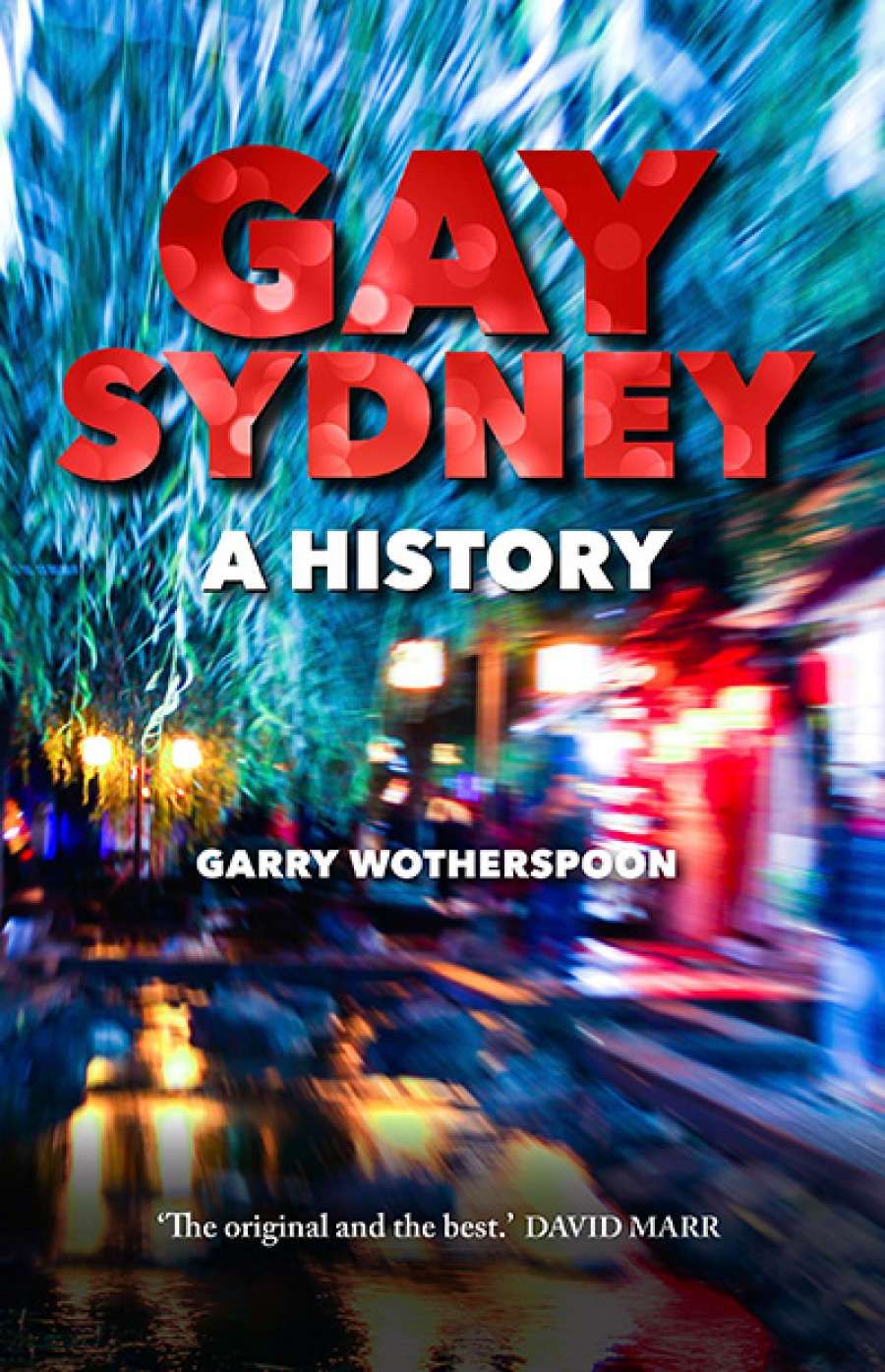
- Free Article: No
- Contents Category: Australian History
- Custom Article Title: Robert Reynolds reviews 'Gay Sydney: A history' by Garry Wotherspoon
- Review Article: Yes
- Online Only: No
- Book 1 Title: GAY SYDNEY: A HISTORY
- Book 1 Subtitle: A HISTORY
- Book 1 Biblio: NewSouth $29.99 pb, 373 pp, 9781742234830
The book effectively opens during the interwar years, when a homosexual sub-culture and identity began to emerge in Sydney. The social and cultural disruption of World War II followed by the long years of postwar economic growth helped create the conditions for a more distinct 'camp' world. True, the 1950s were marked by police repression as young policemen were used as bait in public toilets to entrap homosexuals, and psychiatric texts spruiked a cure for homosexuality. But an unintended consequence of this repressive decade was that it sharpened the identity of the homosexual and publicised his existence and social and sexual practices. Wotherspoon describes this period in Australian gay history as 'an end to unknowing'. In this telling, the repression of the 1950s paved the way for an overt gay Sydney by the late 1960s, which in turn was turbo-charged by 1970s sexual identity politics. Soon, lesbians and gay men were being dragged off the streets of King Cross by police and into paddy wagons at a violent 1978 street protest. Mardi Gras and a new era of Sydney gay life had begun, only to be horribly interrupted by HIV/AIDS a few years later.
This is where the original book left off, and the revisions here are subtle. One marked difference is that Wotherspoon now writes himself into the text. As a lifelong resident of Sydney, Wotherspoon has lived through a fair portion of the story he chronicles. He enters the narrative as a young boy poring over drawings of servicemen showering in a book celebrating the 'fighting men of Australia'. In the 1950s Wotherspoon reappears, now a teenager navigating homoerotic desires in dangerous times. Finding himself an outsider, Wotherspoon writes of becoming 'a watcher behind my mask. Always be careful, never reveal too much; it might give you away.'
Old habits die hard. Wotherspoon does not seem entirely at ease writing himself into Gay Sydney. He pops up infrequently and disappears as quickly, an elusive player, which may be how he likes it. One anecdote, however, stays in this reader's mind. The gay and lesbian activists who marched in the original Mardi Gras parade have entered the pantheon of Australian homosexual history as 'the 78ers'. Akin to war veterans, they are paraded and duchessed each February as Mardi Gras rolls around. It is an exclusive club with a closed membership. Wotherspoon was there at the first parade, but missed the violence. The night was cold, he explains in the book, and the prospect of listening to speakers extol the virtues of revolutionary socialism too dreary. Instead, with some mates, Wotherspoon detoured to a gay pub for warmth and alcohol. This delightful, almost iconoclastic tale left me wanting more details about Wotherspoon's life in gay Sydney. Outsiders sometimes have the best stories to tell.
 Garry Wotherspoon
Garry Wotherspoon
Wotherspoon adroitly updates the reader on the remarkable social changes that have remade gay life since he published City of the Plain: same-sex marriage gaining national prominence as a political issue, queer families, seismic shifts in public acceptance of homosexuality, gay ghettos dissolving as gays and lesbians move to more affordable suburbs, internet hook-ups recalibrating social and sexual lives, and the steady integration of gay life into the mainstream. Wotherspoon, who has a background in urban and transport history, details how gay life has both shaped Sydney and been shaped by the city. He notes the current sense of loss some older gay activists feel in the new liberal dispensation, a world in which revolutionary socialism has been trumped by gay marriage and political lobbying, for the moment at least. But Wotherspoon does not share this melancholy attachment to politics past. Ever the observer, Wotherspoon surveys with an air of wonderment the place gay Sydney has become and records those changes with a cautious optimism.


Comments powered by CComment